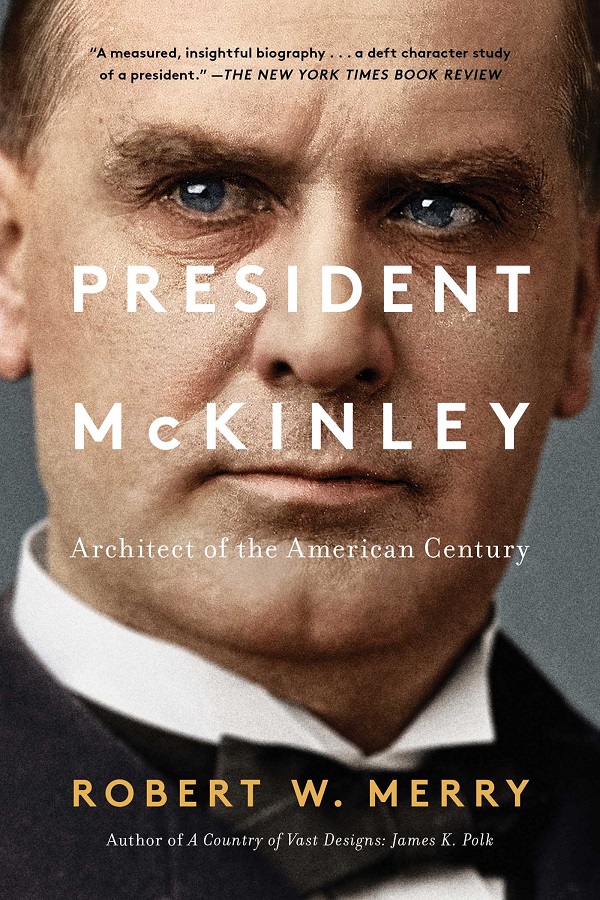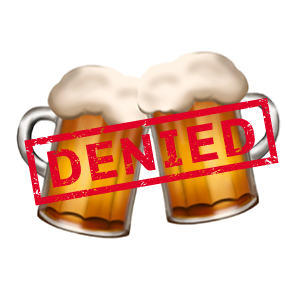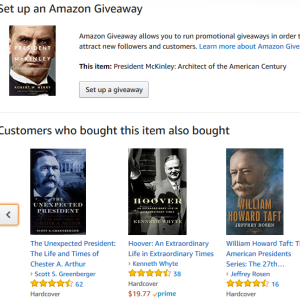
About the Book
-
Author:
- Robert W. Merry
- Genre:
- Memoir / Biography
Cover Story: Giant Sexagenarian Face
Drinking Buddy: Nah
Testosterone Level: Victorian
Talky Talk: The Lens of History
Bonus Factor: Gun Toting Anarchist
Bromance Status: Grandfather
Cover Story: Giant Sexagenarian Face
There he is, number 25, William ‘The Major’ McKinley. First clean shaven president since Andrew Johnson. Strangely, he didn’t smear his face with bronzer or try to hide his thinning hair with an obvious combover.
The Deal:
William who? McKinley is one of those presidents whose administration most Americans can’t place in the correct decade. Seriously, can you name one presidential achievement between Lincoln and McKinley’s successor, Teddy Roosevelt? But McKinley was the one who oversaw America’s transformation from an upstart nation to a dominant world power. This president oversaw the annexation of Hawaii, drove the Spanish out of the Caribbean and the Pacific, and took control of Puerto Rico, Guam, and for a while, Cuba and the Philippines as well. He laid the groundwork for the Panama Canal (only then it was going to be the Nicaragua Canal). He was not a flamboyant president. A lot of his actions are very questionable today. But America dominated the world stage during the 20th century, and this guy led the way.
Drinking Buddy: Nah

I’m sure he was a lovely human being. But when you picture the late 19th century stuffy, humorless, wealthy, cigar smoking, tab collar-wearing white guy, it was William. He wasn’t a drinker, he took umbrage at raunchy jokes, and rare for a U.S. president, he did not golf. Fun as a wild evening discussing the merits of bimetallism would be, I know I’d end up offending him.
Testosterone Level: Victorian
William saw action in the Civil War as a major for the Union (he was the only future president who served in the war and did not become a general). After that, he settled down to a quiet life of politics. While he oversaw American forces in the Spanish American War, The Philippine Occupation, and the Boxer Rebellion, he left the action to men like Colonel Roosevelt, Commodore Dewey, and civilian Herbert Hoover (yes, that one).
McKinley was utterly devoted to his wife, Ida. Ida was a sickly woman, prone to fits of jealousy (she once became enraged when her husband seemed too deep in conversation with a woman at President Garfield’s funeral). She was always in poor health, and while the book doesn’t mention this, many historians believe her to have been a bit of a hypochondriac. Her husband was never far from her side, often cancelling appearances or meetings to be with her. It was a devoted, if unexciting marriage.
Talky Talk: The Lens of History
In the 1890s, McKinley was seen as a man who got things done. He defeated Spain, destroying that nation as a world power. He ‘liberated’ their colonies. He saved American lives in China while refusing to demand an American sphere of influence, unlike the rest of the world. He stabilized the U.S. economy. He got us Hawaii.
Of course, he did all this at the expense of the Hawaiians, the Filipinos, the Puerto Ricans, etc. Sure, it was a war of liberation, but sometimes those darn ungrateful natives didn’t appreciate what the benevolent Westerners were doing for them. And if we had to demand a naval base here, some reparation payments there, well, that’s war, right?
The author kind of smooths over all this. Merry lovingly relates how the Western world sent troops to rescue their citizens from China during the Boxer Rebellion. He fails to mention those same troops looted Beijing. The book barely touches on the loss of Hawaiian culture. On the other hand, if the U.S. hadn’t annexed the islands, Japan almost certainly would have, which would have given them an almost insurmountable strategic advantage during the Second World War.
Finally, McKinley was the protege of President Rutherford Hayes, the bearded bastard who stole the 1876 election and set the civil rights movement back twenty years. McKinley didn’t do a lot for African-Americans during his terms, other than acknowledge his disapproval of lynchings and disenfranchisement.
This was a 500 page book, and I’ll admit that I kind of checked it out at the library to be funny. ‘Look at me, I’m reading a dense biography of an obscure president.’ But once I got into it, I didn’t want to stop. True, it’s tedious in points, especially when they start talking about the economy. But if you’d like to know more about an overlooked era and an under-remembered president, you might pick this one up.
Bonus Factor: Gun Toting Anarchist

Alas, McKinley was not destined to die in bed. An anarchist named Leon Czolgosz, in an misguided attempt to impress Jodie Foster, er, Emma Goldman, shot the president in the stomach. You see, McKinley was at the Pan American Exposition in Buffalo…No, I can’t do the story justice. Let’s let Neil Patrick Harris sing us the story of the assassination. Seriously.
Bromance Status: Grandfather
You were no Jack Kennedy. You weren’t even a William Howard Taft. But right or wrong, you really helped make the U.S. what it is today. Hail to the chief.
Literary Matchmaking: Take Your Pick

FTC Full Disclosure: I received neither money nor a cushy government job for writing this review.